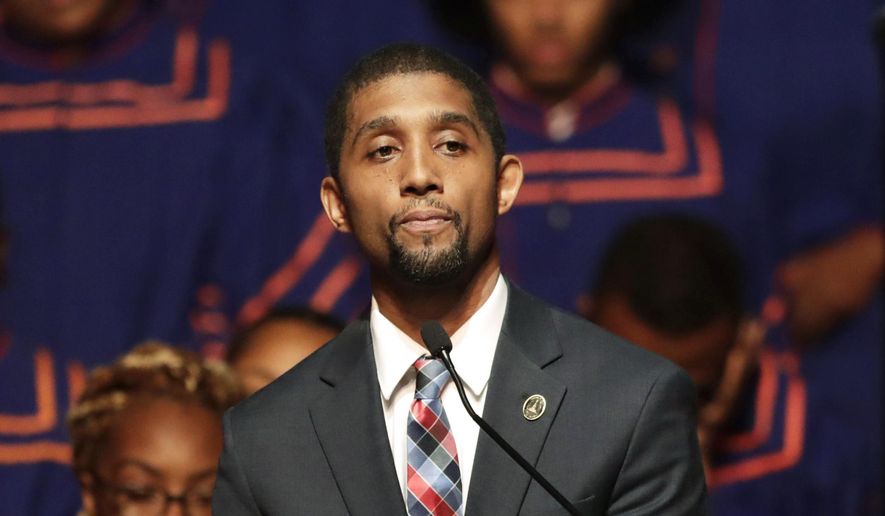BALTIMORE (AP) - With characteristic optimism, Democratic nominee for Baltimore mayor Brandon Scott attempted to inspire hope in the struggling city’s future Wednesday as he reiterated campaign promises to address gun violence and increase education funding.
Scott, who currently serves as City Council president, claimed his party’s nomination for mayor late Tuesday, a week after an election conducted primarily through mail-in ballots. He emerged victorious from a crowded field of more than 20 candidates, including incumbent Mayor Bernard C. “Jack” Young and former Mayor Sheila Dixon.
“Our campaign for mayor was about building a new way forward for our city, recognizing that Baltimore could not continue down the path that we were on,” Scott said in a victory speech delivered outside his grandmother’s home. “Our campaign was about showing that we could bring people together around a shared vision for Baltimore, one where we’re not afraid to talk about Baltimore’s horrific past of racial inequality and dare to say that we can erase it.”
The general election in November is his to lose in a city where Democrats outnumber GOP voters 10-1. Running against him is Republican Shannon Wright, a nonprofit executive.
Scott’s election signals that generational change is on its way to City Hall.
“It will be interesting to see how he brings his perspective on policing in the communities, and his approach to decreasing the crime rate,” said Mileah Kromer, director of the political science program at Goucher College in Towson, Maryland. “Baltimoreans by and large said that crime was their No. 1 issue, and he has to hit the ground running because if you look at the murder rate over the past couple of months, it is not getting better.”
Despite stay-at-home directives prompted by the coronavirus pandemic, as of Wednesday, Baltimore had recorded 140 homicides this year. That’s six more compared to the same period last year, which ended with a total of 348 killings.
Scott proposed a new approach to reducing violence by treating it as a public health crisis in which agencies citywide, not just the police department, must collaborate. He promised to reduce the annual number of homicides to less than 300 during his first year in office. That has not happened since 2014.
Scott has not always agreed with police leadership and most recently opposed Baltimore Police Commissioner Michael Harrison’s decision to start an aerial surveillance pilot program amid the pandemic. After his victory speech, Scott told reporters the police department’s budget “is going to have to decrease” so that the city can increase funding for education, health, and recreation and parks needs.
“We have to do that in a responsible manner,” he said.
Neither the police department nor the union representing officers immediately responded to email and telephone requests for comment.
In addition to violent crime, Scott will inherit a city afflicted by failing and outdated schools, an established illegal drug market, entrenched poverty and a population exodus.
Scott, 36, has been a city councilman since 2011 and became council president last year. He was selected by his peers for that job after Mayor Catherine Pugh resigned and then-council president Young rose to take her place.
Pugh stepped down amid investigations into the lucrative sales of her self-published children’s books. She pleaded guilty to federal conspiracy and tax evasion charges and was sentenced to three years in prison in February.




Please read our comment policy before commenting.